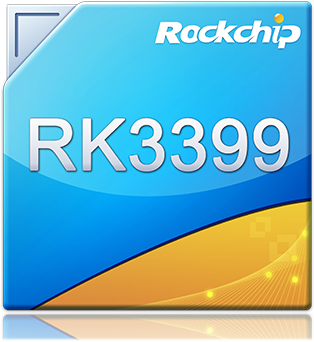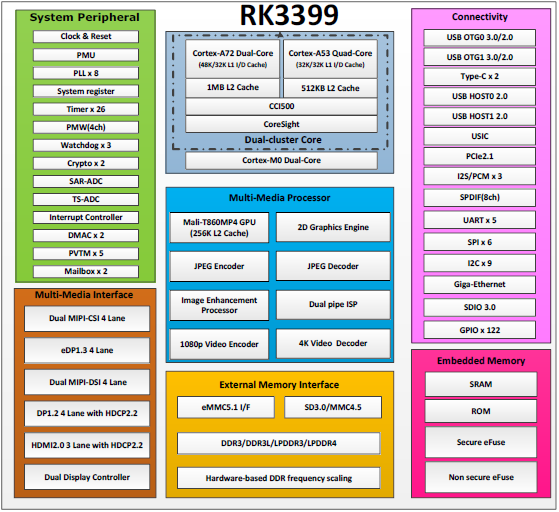Difference between revisions of "RK3399"
| (130 intermediate revisions by 7 users not shown) | |||
| Line 1: | Line 1: | ||
| − | |||
| − | + | Rockchip RK3399 SoC integrates dual-core Cortex-A72 and quad-core Cortex-A53 with separate NEON coprocessor, and with ARM Mali-T864 GPU. | |
| − | = | + | {| border="0" cellpadding="1" cellspacing="1" class="infobox" style="width: 300px;" |
| + | |- | ||
| + | | [[File:RK3399 Soc.png|RTENOTITLE]] | ||
| + | |} | ||
| − | + | = Overview = | |
| − | + | RK3399 is a low power, high performance processor for computing, personal mobile internet devices and other smart device applications. Based on Big.Little architecture, it integrates dual-core Cortex-A72 and quad-core Cortex-A53 with separate NEON coprocessor.<br/> Many embedded powerful hardware engines provide optimized performance for high-end application. RK3399 supports multi-format video decoders including H.264/H.265/VP9 up to4Kx2K@60fps, especially, H.264/H.265 decoders support 10bits coding, and also supports H.264/MVC/VP8 encoders by 1080p@30fps, high-quality JPEG encoder/decoder, and special image preprocessor and postprocessor.<br/> Embedded 3D GPU makes RK3399 completely compatible with OpenGL ES1.1/2.0/3.0/3.1, OpenCL and DirectX 11.1. Special 2D hardware engine with MMU will maximize display performance and provide very smooth operation.<br/> RK3399 has high-performance dual channel external memory interface (DDR3/DDR3L/LPDDR3/LPDDR4) capable of sustaining demanding memory bandwidths, also provides a complete set of peripheral interface to support very flexible applications. | |
| | ||
| − | = | + | = SoC Features = |
| − | |||
| − | |||
| − | |||
| − | |||
| − | |||
| − | |||
| − | |||
| − | |||
| − | {| border=" | + | {| border="0" cellpadding="1" cellspacing="1" style="width: 972px;" |
| − | |||
| − | |||
| − | |||
| − | |||
| − | |||
|- | |- | ||
| − | | style="width: | + | | style="width: 530px;" | |
| − | + | *CPU: | |
| − | + | **Big.Little architecture: Dual Cortex-A72 + Quad Cortex-A53, 64-bit CPU | |
| − | + | **Frequency is over 1.8GHz (Big cluster) | |
| − | + | **L1 cache | |
| − | + | ***48KB Icache and 32KB Dcache for each A72 | |
| − | + | ***32KB Icache and 32KB Dcache for each A53 | |
| − | + | **L2 cache | |
| + | ***1024KB for big cluster | ||
| + | ***512KB for little cluster | ||
| + | *Internal SRAM | ||
| + | **192KB total | ||
| + | **4KB used by bootrom when bootup | ||
| + | *GPU: | ||
| + | ** Mali-T864 GPU, OpenGL ES1.1/2.0/3.0/3.1, OpenCL, DX11 | ||
| + | **Supports AFBC (ARM Frame Buffer Compression) | ||
| + | *Display: | ||
| + | **Dual VOP: one supports 4096x2160 with AFBC supported;The other supports 2560x1600 | ||
| + | **Dual channel MIPI-DSI (4 lanes per channel) | ||
| + | **eDP 1.3 (4 lanes with 10.8Gbps) to support display, with PSR | ||
| + | **HDMI 2.0 for 4K 60Hz with HDCP 1.4/2.2 | ||
| + | **DisplayPort 1.2 (4 lanes, up to 4K 60Hz) | ||
| + | **Supports Rec.2020 and conversion to Rec.709 | ||
| + | *Camera: | ||
| + | ** Dual mipi CSI,dual ISP,Maximum input resolution of 13M pixels | ||
| + | *Memory: | ||
| + | **Dual channels 64-bit DRAM controller | ||
| + | **Support DDR3/DDR3L, LPDDR3, LPDDR4 | ||
| + | *Connectivity: | ||
| + | **PCIe 2.1 (4 full-duplex lanes with 20Gbps) | ||
| + | **Embedded low power MCU for other application | ||
| + | **8 channels I2S supports 8 channels RX or 8 channels TX | ||
| − | + | | style="width: 429px;" | [[File:RK3399 Block Diagram.png|RTENOTITLE]] | |
| − | |||
| − | |||
| − | |||
| − | |||
| − | |||
| − | |||
| − | |||
| − | | | ||
| − | |||
| − | |||
| − | |||
| − | |||
| − | |||
| − | |||
|} | |} | ||
| | ||
| − | |||
| − | + | = Documentation = | |
| − | RK3399 | + | #[http://opensource.rock-chips.com/images/f/f9/RK3399_Linux_Debain_V1.1_Development_Guide170620.pdf RK3399_Linux_Debain_V1.1_Development_Guide170620.pdf] |
| − | + | #[http://opensource.rock-chips.com/images/5/5d/RK3399_Linux_Debian_v1.1开发说明170620.pdf RK3399 Linux Debian v1.1开发说明170620.pdf] | |
| − | + | #[http://opensource.rock-chips.com/images/9/92/RK3399_Linux_Buildroot_V1.2_Development_Guide170619.pdf RK3399_Linux_Buildroot_V1.2_Development_Guide170619.pdf] | |
| − | + | #[http://opensource.rock-chips.com/images/0/05/RK3399_Linux_Buildroot_V1.2开发说明170619.pdf RK3399_Linux_Buildroot_V1.2开发说明170619.pdf] | |
| + | #[http://opensource.rock-chips.com/images/2/20/RK3399_Multimedia_Codec_Benchmark_v1.0.pdf RK3399_Multimedia_Codec_Benchmark_v1.0.pdf] | ||
| − | = | + | = Software = |
| + | See [[Linux_user_guide|Linux User Guide]] setup LInux OS generally; | ||
| + | See [[U-Boot|U-Boot]] guide to develop U-Boot; | ||
| − | + | See [[Rockchip_Kernel|Rockchip kernel]] to develop kernel; | |
| − | + | See [[Buildroot|buildroot and]] [[Debian|debian to]] develop and rootfs. | |
| − | + | | |
| − | + | == Chip configuration == | |
| − | === | + | {| border="1" cellpadding="1" cellspacing="1" class="table_style" style="width: 859px;" |
| − | + | |- | |
| − | + | ! style="width: 68px; text-align: center;" | '''chip''' | |
| + | ! style="width: 181px; text-align: center;" | '''Kernel eMMC index''' | ||
| + | ! style="width: 142px; text-align: center;" | '''Kernel SD index''' | ||
| + | ! style="width: 158px; text-align: center;" | '''Uboot eMMC index''' | ||
| + | ! style="width: 146px; text-align: center;" | '''Uboot SD index''' | ||
| + | ! style="width: 132px; text-align: center;" | '''Baud speed''' | ||
| + | |- | ||
| + | | style="width: 68px; text-align: center;" | RK3399 | ||
| + | | style="width: 181px; text-align: center;" | 1 | ||
| + | | style="width: 142px; text-align: center;" | 0 | ||
| + | | style="width: 158px; text-align: center;" | 0 | ||
| + | | style="width: 146px; text-align: center;" | 1 | ||
| + | | style="width: 132px; text-align: center;" | 1500000 | ||
| + | |} | ||
| | ||
| − | |||
| − | |||
| − | |||
| − | |||
| − | |||
| − | |||
| − | |||
| − | |||
| − | |||
| − | |||
| − | |||
| − | |||
| − | |||
| − | |||
| − | |||
| − | |||
| − | |||
| − | |||
| − | |||
| − | |||
| − | |||
| − | |||
| − | |||
| − | |||
| − | = | + | = [http://opensource.rock-chips.com/wiki_Devices#RK3399_Boards RK3399 Devices List] = |
| − | |||
| − | |||
| | ||
| − | = | + | = References = |
| − | |||
| − | |||
| − | |||
| − | |||
| − | |||
| − | |||
| − | |||
| − | |||
| − | |||
| − | + | [https://en.wikipedia.org/wiki/ARM_Cortex-A72 https://en.wikipedia.org/wiki/ARM_Cortex-A72] | |
| − | + | [http://www.rock-chips.com/a/en/products/RK33_Series/2016/0419/758.html http://www.rock-chips.com/a/en/products/RK33_Series/2016/0419/758.html] | |
| − | + | [https://www.arm.com/zh/products/multimedia/mali-gpu/high-performance/mali-t860-t880.php https://www.arm.com/zh/products/multimedia/mali-gpu/high-performance/mali-t860-t880.php] | |
Latest revision as of 01:43, 29 August 2019
Rockchip RK3399 SoC integrates dual-core Cortex-A72 and quad-core Cortex-A53 with separate NEON coprocessor, and with ARM Mali-T864 GPU.

|
Contents
Overview
RK3399 is a low power, high performance processor for computing, personal mobile internet devices and other smart device applications. Based on Big.Little architecture, it integrates dual-core Cortex-A72 and quad-core Cortex-A53 with separate NEON coprocessor.
Many embedded powerful hardware engines provide optimized performance for high-end application. RK3399 supports multi-format video decoders including H.264/H.265/VP9 up to4Kx2K@60fps, especially, H.264/H.265 decoders support 10bits coding, and also supports H.264/MVC/VP8 encoders by 1080p@30fps, high-quality JPEG encoder/decoder, and special image preprocessor and postprocessor.
Embedded 3D GPU makes RK3399 completely compatible with OpenGL ES1.1/2.0/3.0/3.1, OpenCL and DirectX 11.1. Special 2D hardware engine with MMU will maximize display performance and provide very smooth operation.
RK3399 has high-performance dual channel external memory interface (DDR3/DDR3L/LPDDR3/LPDDR4) capable of sustaining demanding memory bandwidths, also provides a complete set of peripheral interface to support very flexible applications.
SoC Features
Documentation
- RK3399_Linux_Debain_V1.1_Development_Guide170620.pdf
- RK3399 Linux Debian v1.1开发说明170620.pdf
- RK3399_Linux_Buildroot_V1.2_Development_Guide170619.pdf
- RK3399_Linux_Buildroot_V1.2开发说明170619.pdf
- RK3399_Multimedia_Codec_Benchmark_v1.0.pdf
Software
See Linux User Guide setup LInux OS generally;
See U-Boot guide to develop U-Boot;
See Rockchip kernel to develop kernel;
See buildroot and debian to develop and rootfs.
Chip configuration
| chip | Kernel eMMC index | Kernel SD index | Uboot eMMC index | Uboot SD index | Baud speed |
|---|---|---|---|---|---|
| RK3399 | 1 | 0 | 0 | 1 | 1500000 |
RK3399 Devices List
References
https://en.wikipedia.org/wiki/ARM_Cortex-A72
http://www.rock-chips.com/a/en/products/RK33_Series/2016/0419/758.html
https://www.arm.com/zh/products/multimedia/mali-gpu/high-performance/mali-t860-t880.php


